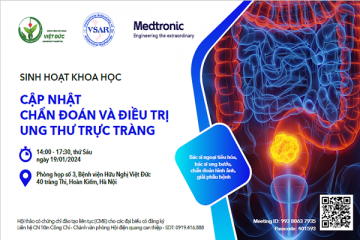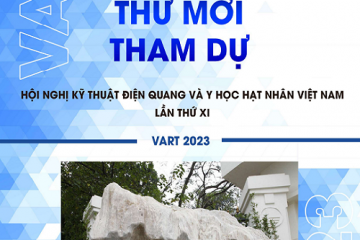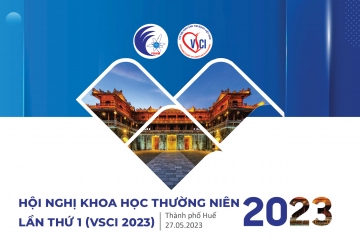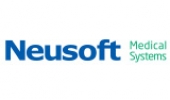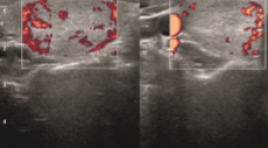
ĐÁNH GIÁ HIỆU QUẢ ĐIỀU TRỊ U LÀNH TUYẾN GIÁP CÓ ĐIỂM THẨM MỸ ≥ 3 BẰNG ĐỐT SÓNG CAO TẦN
13/10/2023 17:49:10 | 0 binh luận
SUMMARY Purpose: To evaluate the efficacy of radiofrequency ablation (RFA) for benign thyroid neoplasms with a cosmetic score of more than 3. Materials and Methods: This prospective study was performed on 60 patients with benign thyroid nodules with a cosmetic score of more than 3 by radiofrequency ablation under ultrasound guidance at 108 Military Central Hospital from January 1. 2021 to July 2022. We evaluated the change in cosmetic, volume, angiogenesis, and clinical symptoms of patients at 1, 3, and 6 months after the intervention as well as complications, complications during intervention and treatment monitoring. Results : Most patients are female, accounting for 91.7%. The most common age group is from 30 to 50 years old, accounting for 45% and the average age is 43.2 years old. Grade 3 and grade 4 cosmetic scores are equivalent. After 6 months of RFA, the angiogenesis score decreased to 24%, followed by the volume of thyroid nodules decreasing to 37%. The score of symptoms and cosmetics decreased by about 50% compared to before treatment. Complications were mild pain and mild hematoma after RFA, accounting for 5%. Conclusion: Radiofrequency ablation is an effective and safe method for improving the cosmetic point of the neck in the treatment of benign thyroid nodules. Keywords: Benign thyroid nodules, cosmetic score ≥ 3, radiofrequency ablation.
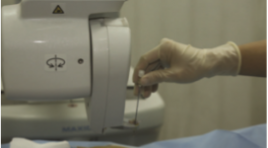
ĐÁNH GIÁ HIỆU QUẢ GIẢM ĐAU BẰNG TIÊM CỒN TUYỆT ĐỐI DIỆT HẠCH ĐÁM RỐI THÂN TẠNG DƯỚI HƯỚNG DẪN CỦA CẮT LỚP VI TÍNH VÀ ROBOT MAXIO
12/10/2023 09:54:20 | 0 binh luận
SUMMARY Objective : Researches on blocking afferent pathways of pain sensation to the central nervous system, relieving cancer pain, chronic pain in the upper abdomen is conducted. Methods: This prospective observational study is conducted on 30 patients whose coeliac plexus was blocked from June 2018 to December 2020 at 108 Military central hospitals. Results: Pre-intervention patients have been severe pain with a VAS score ≥ 6, which greatly affected the quality of life. After coeliac plexus block, 22/30 patients achieved the expected analgesia. The most common side effect is diarrhea. No serious complications Conclusion: The absolute–alcohol injection technique to block the coeliac plexus by computed tomography and Maxio robot-guided offer high precision, the efficacy of initial treatment, and low complication rate. Key words : Cancer pain, coeliac plexus block
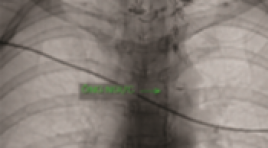
ĐÁNH GIÁ GIÁ TRỊ CỦA KỸ THUẬT CHỤP BẠCH MẠCH TRUNG TÂM SỐ HÓA XÓA NỀN QUA HẠCH BẸN
11/10/2023 16:36:05 | 0 binh luận
SUMMARY Purpose: Describe the technique and evaluate imaging results of the fluoroscopic inguinal intranodal lymphangiography technique. Subjects and methods : Case series study on 37 patients, all were done fluoroscopic inguinal intranodal lymphangiogram. Results: The study was conducted on 37 patients (11 men, 26 women), mean age, 56. The technique was successful in all patients (100%), detected anatomic variants of lymphatic central in 30% of patients, leak point 31/37 cases accounting for 84%. The average time to observe the target lymph vessel was 35.3 ± 20.2 minutes. Conclusions : fluoroscopic inguinal intranodal lymphangiography is a safe procedure, provides visualization of central lymphatic anatomy, detected leak points, and guides for percutaneous lymphatic interventions. Keywords: lymphangiography, thoracic duct embolization, chyle leakage, chylothorax, Chyluria

Hình ảnh cộng hưởng từ ung thư biểu mô tế bào gan và bảng phân loại LI-RADS
31/03/2020 16:14:51 | 0 binh luận
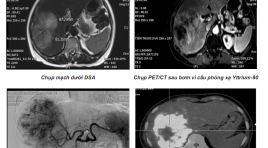
Đánh giá hiệu quả bước đầu trong điều trị ung thư biểu mô tế bào gan bằng phương pháp nút mạch sử dụng hạt vi cầu phóng xạ Yttrium-90
28/05/2020 15:56:42 | 0 binh luận
T he results of Y90 radioembolization in treatment of hepatocellular carcinoma SUMMARY Background : Hepatocellular carcinoma (HCC) is aggressive primary malignancy of the liver that most commonly presents late in the disease course. As a result, the majority of patients are not candidates for curative therapies. Locoregional therapies including Yttrium-90 (Y-90) radioembolization play an important role in management of the vast majority of patients with HCC. Methods : Patients with unnresectable HCC (n=41) treated with Y-90 radioembolization from 2013 to 2016 were evaluated retrospectively. Data was abstracted from medical records including patient charts, laboratory data, and imaging. Results : The most common clinical toxicity among all patients was fatigue (58.5%). A clinical benefit, defined as patients achieving PR was seen in 95.13% of cases; was seen complete reponse (CR) in 4.87%. The mean overall survival from the time of diagnosis was 18.4 months. Conclutions : For patients with HCC, Y-90 radioembolization is a safe and well-tolerated procedure. Our experience suggests that a significant percentage of patients achieve clinical benefit including many with PR. Prospective, randomized data is required to compare radioembolization with other therapies including chemoembolization and systemic therapy with sorafenib. Keywords : Radioembolization, Yttrium-90 microspheres, SIR-spheres, Hepatocellular carcinoma, Transarterial radioembolization, SIRT.

Chẩn đoán hình ảnh tồn tại và quá thể kính nguyên thủy ( TTTKNT)
31/03/2020 16:06:09 | 0 binh luận
Persistence and hyperplasia of primitive vitreous humor (PHPV) SUMMARY Objective: To present three rare cases of PHPV in baby which were diagnosed with USG and CT scanner at 2 different syndromes. The authors want to find out the diagnostic imaging capability of this affection on each syndrome. Material and methode: Cross-section description study of 3 cases with USG and CT scanner. Result: The patient parent discover when the baby always rubs the eyes because they can’t see anything. Other clinical examination, the diagnosis is set with UGS as a solid mass in the vitreous corpus, no adherence in the macula, no hypervascularization on color Doppler image some small calcified nodes at all 2 eyes leading to total blindness. One of two patient has associated anomalies of the brain: turricephaly, corpus callosum atrophy, lissenpachygyria calling Aicardi syndrome. CT scanner is indicated only to set the differential diagnosis of retinoblastoma with calcification and possible extension in the retrobulbar space and optic nerv. Conclusion: PHPV is a rare anomaly, difficult to prenatale diagnose but easy post delivery by USG, needing probe over 10 MHz and color doppler; transcranial sonogaphy gives avaluable image. CT is indicated only to detecte calcification for rule out retinoblastoma. IRM is not necessary except intend to investigate brain malformation. Key word: vitreous humor.

Nghiên cứu một số thông số xạ hình thận TC99- DTPA ở người bình thường
02/04/2020 15:09:14 | 0 binh luận
Quantitative evaluation of Tc99m – DT PA Renoscintigraphy parameters in healthy people SUMMARY: Aims: The purpose of our study was to determinate quantitative parameters in Tc99m-DTPA Renoscintigraphy in healthy people. Materials and Methods: Tc99m-DTPA renoscintigraphy was performed in 44 consecutive healthy people, mostly potential live kidney donors in Nuclear Medicne Department, 108 central military hospital. Quantitative parameters including Glomerular Filtration Rate (GFR) were determined by gamma camera using the dedicated software. Results: There were no significant differences of kidney areas, depths and quantitative parameters such as perfusion %, uptake % between the two kidneys. There was no diffirence between mean GFR ± SD of the left and right kidney (52.8 ± 13.4 vs 51.07 ± 12. 65 ml per minute, respectively) and total GFRs were in wide range from 78 to 155 ml per minute. Conclusions: Tc99m-DTPA renoscintigraphy quantitative parameters in the healthy people could be used as reference to research and clinical practice.
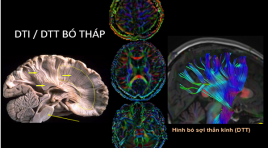
MRI khuếch tán theo hướng và bó sợi thần kinh (DTI/DTT)
23/12/2019 22:44:46 | 1 binh luận
Chụp cộng hưởng từ khuếch tán sức căng (DTI- diffusion tensor imaging) là một công nghệ tương đối mới, phổ biến để chụp ảnh chất trắng của não. Mục tiêu của bài chia sẻ là đưa ra một cái nhìn tổng quan cơ bản và rộng rãi về DTI để bạn bè đồng nghiệp có thể hiểu về kỹ thuật mới này và nắm rõ được những điểm mạnh và điểm yếu của nó.
Bạn Đọc Quan tâm
Sự kiện sắp diễn ra
Thông tin đào tạo
- Những cạm bẫy trong CĐHA vú và vai trò của trí tuệ nhân tạo
- Hội thảo trực tuyến "Cắt lớp vi tính đếm Photon: từ lý thuyết tới thực tiễn lâm sàng”
- CHƯƠNG TRÌNH ĐÀO TẠO LIÊN TỤC VỀ HÌNH ẢNH HỌC THẦN KINH: BÀI 3: U não trong trục
- Danh sách học viên đạt chứng chỉ CME khóa học "Cập nhật RSNA 2021: Công nghệ mới trong Kỷ nguyên mới"
- Danh sách học viên đạt chứng chỉ CME khóa học "Đánh giá chức năng thất phải trên siêu âm đánh dấu mô cơ tim"







